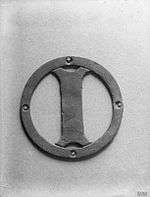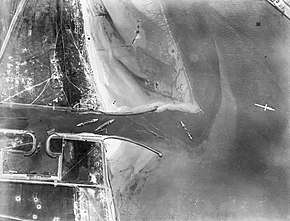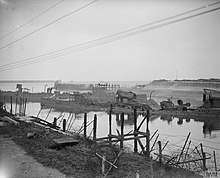HMS Iphigenia (1891)
HMS Iphigenia was an Apollo-class protected cruiser of the Royal Navy built on the River Clyde and launched in 1891. She was subsequently converted as a minelayer and sunk as a blockship during the Zeebrugge Raid on 23 April 1918.
_(14576678520).jpg) Iphigenia | |
| History | |
|---|---|
| Name: | HMS Iphigenia |
| Builder: | London and Glasgow Shipbuilding Company |
| Laid down: | 17 March 1890 |
| Launched: | 19 November 1891 |
| Commissioned: | May 1893 |
| Fate: | Expended as a block ship, 1918 |
| Badge: |
 Ship's badge of HMS Iphigenia (IWM Q20184) |
| General characteristics | |
| Class and type: | Apollo-class cruiser |
| Displacement: | 3,600 tons |
| Length: | 314 ft (95.7 m) |
| Beam: | 43.5 ft (13.3 m) |
| Draught: | 17.5 ft (5.3 m) |
| Propulsion: |
|
| Speed: | 19.75 knots (36.58 km/h) |
| Complement: | 273 to 300 (Officers and Men) |
| Armament: |
|
History
Ordered under the Naval Defence Act 1889, Iphigenia was laid down in 1891 at the yard of the London and Glasgow Shipbuilding Company. She returned from duty on the China Station in 1906.

Along with a number of other ships of her class, as she became obsolete as a cruiser she was converted at Chatham Dockyard into a minelayer. This work was completed by August 1907. She was then based at Dover and Sheerness. In 1917 she was in use as a depot ship in the White Sea as part of the British North Russia Squadron.[1] Along with HMS Intrepid and HMS Thetis she was selected to be used as a blockship during the Zeebrugge Raid. She was sunk at the entrance to the Bruges Canal to try and prevent it being used by German U-Boats.[2] She was subsequently broken up when the canal was cleared.

References
- Ship's Log, The National Archives (TNA), 7 August 1916, ADM 53/44936
- Monograph No. 18: The Dover Command: Vol I (PDF). Naval Staff Monographs (Historical). VI. The Naval Staff, Training and Staff Duties Division. 1922.
Publications
- Colledge, J. J.; Warlow, Ben (2006) [1969]. Ships of the Royal Navy: The Complete Record of all Fighting Ships of the Royal Navy (Rev. ed.). London: Chatham Publishing. ISBN 978-1-86176-281-8.
- Gardiner, Robert; Gray, Randal, eds. (1985). Conway's All The World's Fighting Ships 1906–1921. London: Conway Maritime Press. ISBN 0-85177-245-5.CS1 maint: ref=harv (link)
External links
- HMS Iphigenia, Index of 19th Century Naval Vessels
- HMS Iphigenia at Naval-History.net